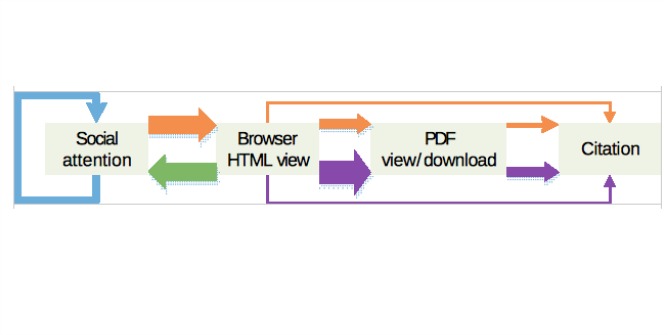 ORCID provides a unique identifier for each researcher, managed centrally, in order to distinguish between people and correctly identify outputs. Peter Webster thinks the service is a great idea but worries that there is a risk of the arts and humanities getting left behind. Publications that do not have a Digital Object Identifier (DOI) will not be included, meaning that entries will have to be added manually.
ORCID provides a unique identifier for each researcher, managed centrally, in order to distinguish between people and correctly identify outputs. Peter Webster thinks the service is a great idea but worries that there is a risk of the arts and humanities getting left behind. Publications that do not have a Digital Object Identifier (DOI) will not be included, meaning that entries will have to be added manually.
It has been very encouraging to see the launch and early success of ORCID, a service which (on the face of it) would seem to offer a solution to one of the key problems of decentralised scholarship and publication: how to connect, in a machine-readable way, all of your published output.
The problem is obvious, really. I have published nine articles over a period of six years: some in journals, some in annual volumes that look a bit like journals, others in collections of essays. At the same time, I’ve published a host of book reviews, some in print journals which exist online, others in online-only publications like Reviews in History. I’ve also had a hand in a number of funded research projects which issued in various semi-published reports. Oh, and there’s my blog. And the only means of connecting them together (and distinguishing them from the doubtless admirable work of Peter Webster the oceanographer, and Peter Webster the archaeologist) is that blog, which exists only in unstructured HTML, and so isn’t easily picked up by automated services.
So: a unique identifier for each researcher, managed centrally somehow, seems to make a lot of sense. And so here it is: my shiny new ORCID ID. ORCID will allow you to associate articles that have Digital Object Identifiers with your ID. It is early days for the service, but for me there is already an issue, even now. There is a risk of the arts and humanities getting left behind, and here’s why.
Of my nine published articles, only one of them appeared in a journal which routinely assigns DOIs. The rest appeared only in print. OK (you might think): that’s because some of them are on the old side, and so the picture ought to improve over time. Answer: yes, up to a point.
Later this year this article in Parliamentary History should come with a DOI, certainly. However, another paper on Michael Ramsey, archbishop of Canterbury, will appear in a printed volume some time in 2014, which is unlikely to appear as an e-book. Similarly, my book on Michael Ramsey, also slated for 2014, will appear only in print. And, the book the proposal for which I’ve just agreed contract terms (due for completion in 2014 and thus for publication in 2015) won’t appear as an e-book either, unless things change very quickly.
Some of this could be solved by allowing the association of ISBNs with researcher IDs in ORCID, but the first release didn’t support it. There is now some ISBN integration, which is very welcome, although some of the mapping of roles is not quite adequate, particularly in relation to chapters in edited collections. More prosaically, these records all need adding manually, if there is no DOI. For me, it is still definitely worth the effort, but the time-benefit analysis is different.
I also have no fewer than 20 items in an institutional repository, all of them with structured metadata which could usefully be integrated in some way; but there are multiple different repository platforms, integration with which needs the co-operation of the makers of each system and has its own costs.
But more generally, ORCID seems to me to be a system that suits the natural sciences, where most publishing happens in journals that are available electronically, and from publishers of the size to be able to implement DOIs. Encouragingly, the current ODIN project, led in the UK by the British Library, is investigating workflows for integrating author identifier schemes like ORCID with research objects without DOIs, although the project won’t report until 2014. But for now, at least, ORCID doesn’t match how humanities publication works; and I don’t see how that will change any time soon.
Note: This article gives the views of the author, and not the position of the Impact of Social Science blog, nor of the London School of Economics.
Dr Peter Webster is an historian of religion in contemporary Britain. This is a slightly revised version of a post which first appeared on his blog in October 2012.








It seems there are some straightforward ways to deal with this concern:
1) Humanities scholarly communication platforms could start assigning DOIs, if they or their scholars want to be fully part of the scholarly ecosystem (not only ORCID but altmetrics, etc.). It costs about $275 to be a CrossRef member and assign DOIs, and $1 per DOI. If this matter to scholars, it’s hard to see how why it couldn’t be organized and resourced for most output. Any number of different parties might provide this service, e.g. journals, publishers/platforms, repositories, even via Figshare.
Such DOI assignment might, for example, be done efficiently and at scale by a humanities repository, call it “HumArXiv” after the successful arXiv.org repository used in many sciences. I recently proposed such a system to NEH (National Endowment for the Arts) and others, and am actively investigating how this might be built and funded.
2) ORCID and others could start tracking other identifiers, such as ISBN, or whatever the ODIN Project adopts, or even one of the DOI alternatives that are periodically proposed, such as “Open DOI.” They have their own reasons to do this, for better coverage and service.
Therefore, I don’t see that this is an inherent issue with “how humanities publishing works.” It’s just a need that people and orgs in this area need to act on.
—-
Tim McCormick
Stanford Media X
Founding Member, Open Library of Humanities
@tmccormick / tmccormick (at) gmail / http://tjm.org / Palo Alto, CA, USA
In addition to Tim’s point, it’s worth pointing out that DOI’s can be cheaply retrospectively assigned to published content for just $0.15 per article (http://www.crossref.org/02publishers/20pub_fees.html). All content from 2010 and back is ‘backfile’. Only ‘current’ 2011-2013 articles cost $1 per DOI.
So that even articles published in 1951 like this one in Taxon have a DOI: http://dx.doi.org/10.2307/1217892
See also this Swiss journal that has retrospectively applied DOI’s to all content going back to 1888-1890! http://dx.doi.org/10.5169/seals-153877
Someone should apply for a grant to do this perhaps? It would be a good thing for the global community IMO.
Hi Peter,
Great post, thanks for putting it up. It certainly highlights the issues I’ve seen working on the ODIN project so far. I’ve only been with the british library for a week and the more I look at the problem, the bigger it seems to get.
Although we’re mainly focusing on a conceptual model around longitudinal studies, we’re also looking at user experiences like the one you posted above. There’s an awful lot of commonality and hopefully we’ll not just analyse it, but come up with some practical workflows, advice and real world solutions.
Feel free to get in touch. I may well be asking you questions along the way.
@tomdemeranville
This is a good problem to have, I’d say — interesting, valuable, and addressable!
I think one has to find the balance between respecting the scope and complexity of the problem, and not being disabled by that reflection. As you note, “the more I look at the problem, the bigger it seems to get.”
Often I feel it can be helpful to cut into problems from multiple angles, perhaps even at the same time. For example:
1) start with a public proposal and aim for as much feedback and buy-in as possible;
2) naming/branding, float or establish succinct & compelling terms or project names to see what catches on, to crystallize the idea for people, and to provide rallying points;
3) alternatively, keep it under wraps, approach key partners to offer exclusive, lead roles (not my usual, but hey, no judgments);
4) agile exploration, e.g. identify a minimal viable iteration, build it and launch it as rapidly as possible, see where it goes;
4b) perhaps even, let that agile beginning evolve into a project managed, hosted, “owned”, funded by others. Concerns about “who is the right party to do this sustainably” are sensible, but can stop a project from getting started. So just start it in a way that can let it later find the best home. Even major, established projects like arXiv.org can and have changed institutional home, after all.
On approach #4, here’s a 1-minute proposal for making humanities research more public and trackable, inspired by #pdftribute, #icanhazpdf, and OpenURL:
1) encourage a practice of using tag #paywall whenever tweeting or mentioning a scholarly work that isn’t publicly accessible.
2) monitor for that tag, and crowdsource effort to find any Open Access version (e.g. preprint, author’s last version) or “best available version” (perhaps Wikipedia page, synopsis, precis, or alternate article by same author).
3) Minimally, just reply/retweet with the Open Access version. Better, put the OA version into a repository, perhaps assign it a DOI, and create discoverable associations between it and any other identifiers related to the work, e.g. DOI or ISBN of the non-publicly-accessible version. (a resolver to do this, I propose and call “OpenRef.” Until CrossRef’s lawyers call).
4) #paywall tag occurrence is used to study patterns in demand, and focus efforts where there is highest payoff.
For building such thing I have, as the expression says, upcoming availability. Funders, partners, supporters, let’s talk.
—-
Tim McCormick
Stanford Media X
Founding Member, Open Library of Humanities
@tmccormick / tmccormick (at) gmail / http://tjm.org / Palo Alto, CA, USA
Uh oh. I hope that the take away message for all who read this is not to create another author ID standard for the humanities and social science, but to feed requirements to ORCID ID. Some of the issues raised are also true in the sciences, particularly as we begin to accumulate metrics of impact beyond publishing individual articles.
I was doing some updating of our promotional materials on ORCID and thought I’d add to this article (it’s now 2 years old but just in case anyone is reading it…)
1. ORCID has a 2-way import with Researcher ID (Thomson Reuter)
Researcher ID can be set up with an import of a RIS file or from EndNote = so this is a way, albeit a little circuitous, to get items in without manual typing. EndNote has many options for importing records.
2. ORCID accepts a bibtex import also.
If you keep any kind of reference management list of your own publications (a good idea!) then this should make life easier?
And I wholeheartedly agree that humanities publications need to catch up with assigning DOIs – the reasons are accumulating as time has gone on (e.g. altmetrics).